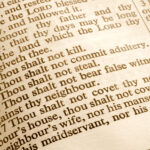The Baptist Joint Committee for Religious Liberty and several other religious groups filed a brief Jan. 6 challenging a Louisiana law that mandates displaying the Ten Commandments in public school classrooms.

“When the government mandates the posting of a preferred version of a religious text to hang on each classroom wall, it is acting beyond its authority,” said BJC General Counsel Holly Hollman.
In contrast, Kelly Shackelford, president and chief counsel for First Liberty, defended the Louisiana Ten Commandments mandate.
“Placing this historic document on schoolhouse walls is a great way to remind students of the foundations of American and Louisiana law, and it fits perfectly in the history and tradition of America,” he said.
Requires posting in every public school classroom
HB 71, signed into law by Louisiana Gov. Jeff Landry, requires every elementary, secondary and post-secondary public school in the state to display an approved version of the Ten Commandments in every classroom.
Roake v. Brumley, a lawsuit brought by nine Louisiana families with children in public schools, asserts HB 71 violates both the Establishment Clause and the Free Exercise Clause of the First Amendment.
The families are represented by the American Civil Liberties Union, the ACLU of Louisiana, Americans United for Separation of Church and State, and the Freedom from Religion Foundation.
In mid-November, a federal district court issued a preliminary injunction prohibiting the implementation of the law.
However, Louisiana Attorney General Liz Murrill asserted the decision applied only to five districts named in the suit and instructed other districts to implement the mandate.
Sign up for our weekly edition and get all our headlines in your inbox on Thursdays
The matter now is before the U.S. Fifth Circuit Court of Appeals, which is scheduled to hear the case in New Orleans on Jan. 23.
The law has ramifications beyond Louisiana. After HB 71 was signed into law last summer, Texas Gov. Dan Patrick pledged to pass a similar bill in the Texas Legislature in 2025.
Joining the BJC in its brief opposing the Louisiana law are the Evangelical Lutheran Church in America and the General Synod of the United Church of Christ, along with Jihyun Oh, stated clerk of the General Assembly of the Presbyterian Church, U.S.A., and Sean W. Row, presiding bishop and primate of the Episcopal Church.
Violation of the First Amendment
In their brief, the BJC and others express their belief “the Ten Commandments represent the original law handed down by God to Moses, with explicitly religious instructions,” such as worshipping God alone and observing the Sabbath.
“HB 71’s posting requirement ensures that these religious instructions will be conveyed continuously, without exception, to every student in Louisiana’s public schools through their formative years,” violating the Establishment Clause of the First Amendment, the brief states.
The brief also asserts “HB 71 grants preferential treatment to a single version of the Ten Commandments,” noting at least four distinct versions and ordering of the commandments—Jewish, Catholic, Lutheran and general Protestant.
“No single religion owns the Ten Commandments, nor can any single denomination claim authority over their proper translation or interpretation,” the brief states. “There are multiple versions of the Commandments, and theological debate continues among (and even within) different denominations about the correct translation and interpretation of the Commandments.
“Through HB 71, the Louisiana legislature declares a victor in this debate by selecting a ‘correct’ version to be imposed on every child in the Louisiana public school system, regardless of their religious beliefs.”
‘State-sponsored religious indoctrination’
Furthermore, the brief asserts a mandate requiring public schools to post the Ten Commandments creates “unavoidable state-sponsored religious indoctrination,” and it “imposes religious instructions on captive audiences” in classrooms.
“For Amici and other Christians, the Bible is holy and authoritative. Reference to its teachings provide direction for believers in daily life,” the brief states.
“Religious communities meet regularly to interpret and understand those religious teachings. It is not the province of the state to supplant that education.”
A separate amicus brief opposing the Louisiana Ten Commandments mandate was filed by the National Council of Jewish Women and 19 other groups representing Hindus, Muslims and Sikhs.
Their brief asserts the law privileges the Protestant interpretation of the Ten Commandments at the expense of other faiths. The brief also argues the law pressures students to venerate a text that may be distinctly different from what is taught in their religious communities.















We seek to connect God’s story and God’s people around the world. To learn more about God’s story, click here.
Send comments and feedback to Eric Black, our editor. For comments to be published, please specify “letter to the editor.” Maximum length for publication is 300 words.